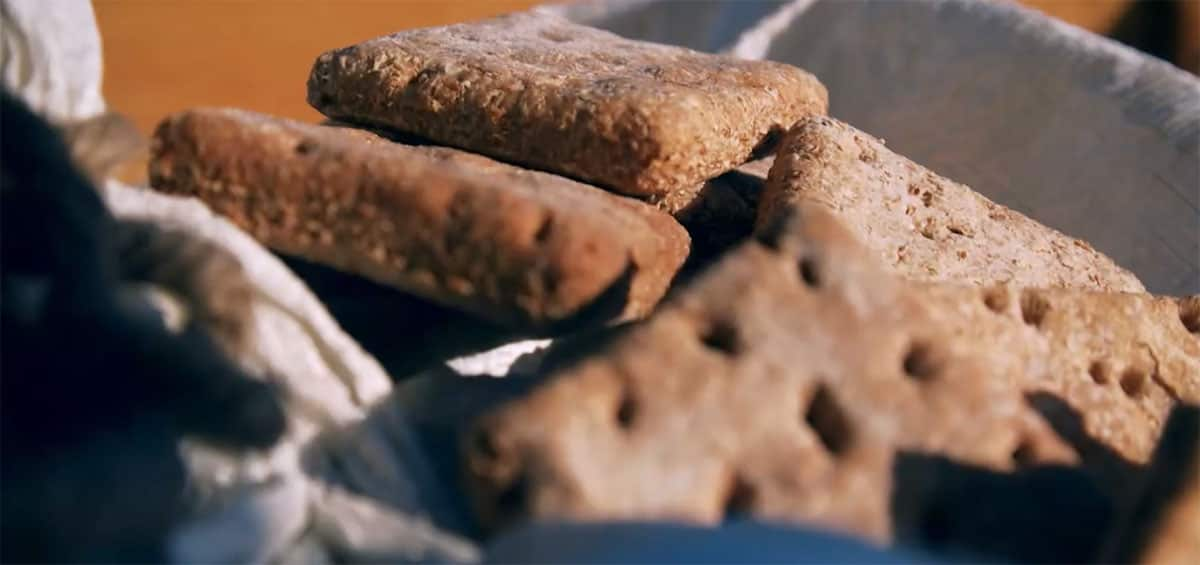“Each meal is about the size of five or six crackers, and a small palm full of dried meat. We had that twice a day, and the second you finished it, you just fantasised about the next time you got it.”
Dan Etheridge is remembering one of the toughest things he’s ever done – joining eight other men in a tiny wooden boat for months at sea, recreating the journey of Captain Bligh and his men after the mutiny on the Bounty.
230 years ago, British navy ship HMS Bounty was sailing from Tahiti to the West Indies. During its voyage, tensions between its crew and its tough young captain - William Bligh – reached breaking point. In the middle of the South Pacific, rebellion broke out. Bligh and a handful of his men were forced off the ship and into a tiny wooden boat. They were left to die at sea – but instead, they navigated more than 6000 kilometres to safety, through unforgiving sees and wild islands, including Australia.
Mutiny – tonight 8.30pm on SBS and then on – sees the journey recreated by nine men, including a doctor, a carpenter, several sailors and Anthony Middleton, previously seen in SAS: Who Dares Wins, taking on Captain Bligh’s role as leader of the expedition. Several of the nine, including Dan Etheridge, were embedded cameramen – filming the unfolding events of the journey while experiencing every challenge.
In a replica 23-foot wooden boat, they face brutal storms, shark-infested waters, the challenges of living in incredibly close quarters. There were amazing highs and some close bonds formed.
And through it all, creating tension and uniting them, was unrelenting hunger.
Like the original crew of nine, the men had extremely limited rations, supplements only by what they could gather when they made landings on islands along the way.
Their rations each day were 22 - 28 grams of biltong, three ships biscuits, one litre of water (this varied depending upon conditions - at later stages of the journey this amount reduced) and whatever they could scavenge from the islands, such as coconuts, local fruit and nuts and oysters.
, also known as hard tack, are hard and dry, usually made with just water, a coarse wholemeal wheat flour and salt. Baked and then left to dry, they have formed of sailors for hundreds of years. While England’s Royal Navy do occasionally use a modern ship’s biscuit in some ration packs, the biscuits for the Mutiny recreation were made by a London bakery called – a rather different task to the iced fancies the company usually makes. As the medic among the nine, Luke Kane, explains, there was never enough food, a hug challenge for men already sleep-deprived and assaulted by the elements.
As the medic among the nine, Luke Kane, explains, there was never enough food, a hug challenge for men already sleep-deprived and assaulted by the elements.

The ship's biscuits served on the modern recreation of Bligh's journey. Source: Windmill Films
“We were constantly doing four hour shifts, so at no point could you sleep for longer than three-and-a-half hours. Over two months, that takes quite a toll on your body. Especially when you’re doing really physical stuff in hard core conditions.
“And absolutely no way did we get enough food. When we didn’t have a little supplement of fruit or coconuts, we were only on about 400 calories a day,” Kane says.
Freddy Benajfield, one of the experienced sailors among the nine, says his main preparation for the series was an attempt to put on weight.
“I prepared by eating everything I could find. My diet for weeks on end consisted of a tub of Ben & Jerries and a pie for breakfast, and then ridiculous amounts of food for the rest of the day. I ended up weighing about 86 kilos, which is huge for me. I ate everything in sight, because I knew food was going to be scarce, and I needed to bulk up. That was the easy side of it. The other thing I did was reading up on the journal of Captain Bligh, and a bit of revision of celestial navigation and stuff like that,” he says.
“Most of us became massively fixated on food. Our diet was really restricted, and it was really monotonous. Apart from occasionally getting fresh fruit on an island, we were basically left eating rock-like sea biscuits and dried meat. We were all fixating on sugar and fat. More so than friends and family, even. Food is one of the hardest things to be deprived of. Food and privacy, “ explains another of the men, Sam Brown.
The men lost enormous amounts of weight during the voyage – some of them more than 20 kilograms.
Fellow “mutineer” Rishi Ravalia says the starvation was an unrelenting challenge.
“Starving, cold, tired, wet... the list goes on. Tensions were very high under these conditions. Not everyone was reading off the same page, so this made tensions that much higher.”
But like the other men, he says the experience was worth it.
“There were many little highs, but amongst the foray of lows, the highs were sky-high-incredible!”
Says sailor Conrad Humphries, “I’ve learned patience, I’ve learned to trust other people’s judgement, I’ve learned to be very content with very little around me. Great happiness can come from the very simple things in life. When we are stripped completely bare, there’s a lot of fun to be had.”




